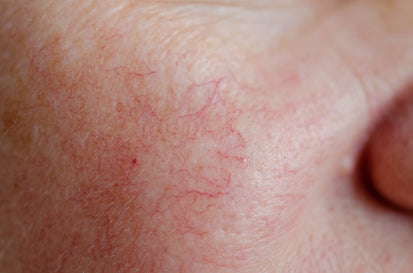What to do against couperosis
Couperosis is an unpleasant skin condition that affects many people. It usually occurs in middle age, but young men or women can also suffer from couperosis. In general, the condition is more common among women than men.

What is couperosis?
Couperosis is a condition in which small, broken blood vessels ("teleangiectasias") become visible on the skin of the face. It can result in red, swollen skin and sometimes small red bumps. Couperosis is often seen on the cheeks, nose, and chin, and is most common among people with lighter skin tones.
THE CAUSE OF Couperosis
Couperosis can be caused by a combination of genetic factors, sun exposure, hormonal changes, alcohol consumption, and aging. It can also be aggravated by factors such as temperature changes, hot drinks, spicy foods, and stress.
THE CHARACTERISTICS OF Couperosis

The characteristics of couperosis are:
- Redness
Red or pink lines or patches on the skin of the face, especially on the cheeks, nose, and chin. - Blood vessels
Small, visible broken blood vessels resembling tiny spiders or twigs. - Sensitive skin
Sensitive or painful skin, especially when touched or exposed to certain weather conditions such as cold, wind, or sunlight. - Burning sensation
A burning or tingling sensation in the face. - Dry skin
Dry, flaky skin around the nose and cheeks.
Couperosis can be mild or severe and can develop into rosacea, a chronic skin condition associated with redness, inflammation, and bumps or pimples on the face.
What is the difference between couperosis and rosacea?
Rosacea and couperosis are both skin conditions that are common on the face, but there is a difference between the two. With couperosis, dilated red and blue veins appear on the face. With Rosacea, these symptoms can also occur, but it is usually combined with other symptoms such as red bumps, pus heads, and swelling. Thus, rosacea often has multiple and/or more severe symptoms. Thus, rosacea often has multiple and/or more severe symptoms. Although the symptoms of rosacea and rosacea are similar, they are different conditions with different causes and treatments.
READ ALL ABOUT ROSACEAWHAT TO DO ABOUT COUPEROSIS?
Reducing alcohol consumption, avoiding exposure to extreme temperatures and avoiding certain foods that can aggravate redness, such as spicy foods, can help control couperosis.
In addition, laser treatment, IPL therapy or electrocautery can also help against couperosis. This treatment uses intense light or electric currents to reduce redness and the visibility of blood vessels.
WHAT SKINCARE STEPS CAN YOU use ?
There are a number of steps you can take yourself to care for your skin:
- Use SPF daily to protect your face from UVA and UVB rays. Use at least an SPF 15, but an SPF 30 is better.
- Give the skin extra protection and care during cold periods such as winter
- Avoid exfoliating. If you want to dilate dead skin cells, choose a salicylic acid-based exfoliant.
- Avoid harsh ingredients such as alcohol, perfume, and menthol.
- Hydrate the skin with ingredients such as hyaluronic acid and glycerin to strengthen the skin barrier and soothe the skin.


Wat kan ik nog meer doen voor het maximale resultaat?
Stappenplan om je Acne aan te pakken
Welke producten heb je nodig?
- Skin Cleanser
- Moisturizing Lotion
- Hyaluronic SPF Day Cream
- 2% Retinol Serum
- Retinol Night Cream
- Purifying Face Scrub
- Green Clay Mask
Hoe gebruik je de producten?
Couperose Skincare plan
The essential steps to soothe, reduce and prevent rosacea.
Morning ritual
- Cleanse your skin every morning with the Skin Cleanser with Tea Tree Oil.
- After cleansing, apply the Moisturizing Lotion to restore your skin's pH level.
- Use the 12% Vitamin C serum. Fill the pipette and empty it onto your palm. Then spread the serum onto your face and neck in upward strokes.
- Apply the Hyaluronic SPF Day Cream to your face and neck.
Retinol is a powerful ingredient that can improve the skin. In some cases, it may be too strong for individuals with couperosis. Consult a dermatologist to see if it is appropriate in your case.
Prefer not to use Retinol? Then choose evening ritual 2.
Evening ritual 1
- Cleanse your skin every morning with the Skin Cleanser with Tea Tree Oil.
- After cleansing, apply the Moisturizing Lotion to restore your skin's pH level.
- After this, use the 2% Retinol Serum. Empty a filled pipette of the serum onto your palm and spread it onto your face and neck in upward motions.
- Finally, gently massage the Retinol Night Cream onto your face and neck.
Evening ritual 2
- Cleanse your skin every morning with the Skin Cleanser with Tea Tree Oil.
- After cleansing, apply the Moisturizing Lotion to restore your skin's pH level.
- Use the 12% Vitamin C serum. Fill the pipette and empty it onto your palm. Then spread the serum onto your face and neck in upward strokes.
- Apply the Hyaluronic Day and Night Cream to your face and neck.
Shop the complete ritual




Disclaimer: It is important to consult a qualified dermatologist to determine the best treatment option for your specific situation.







